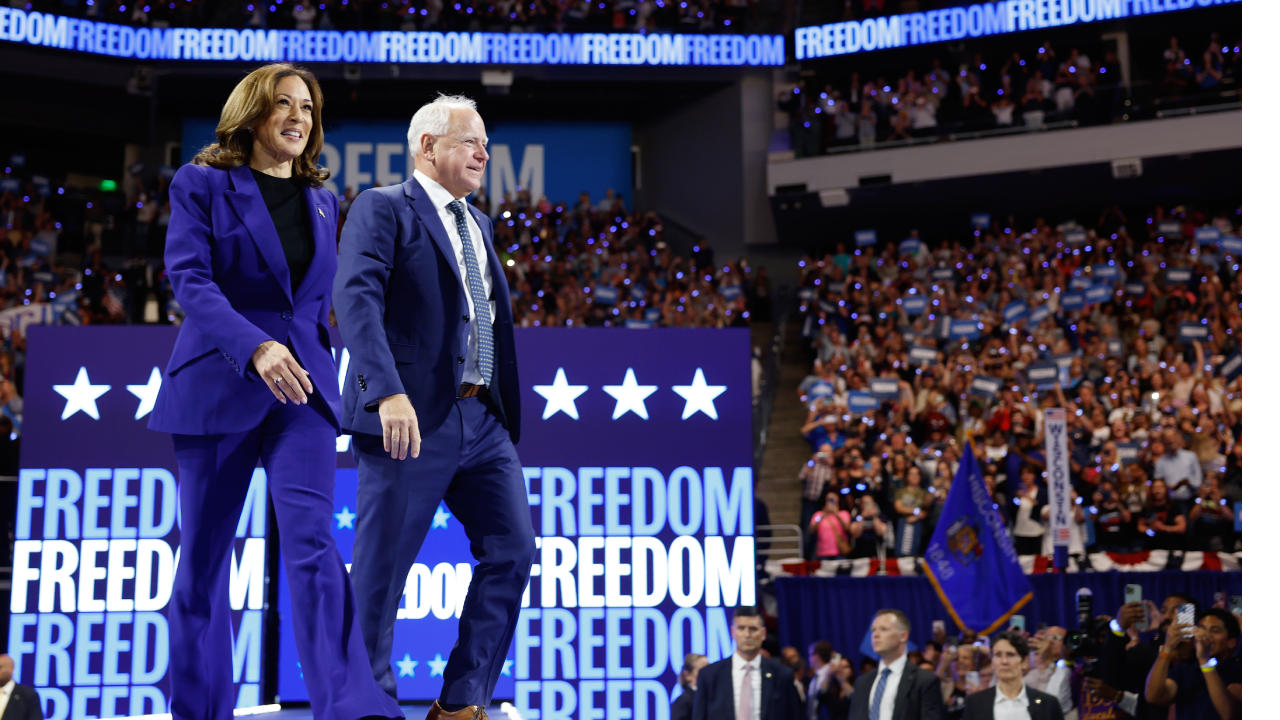Kamala Harris’ campaign has put economic and business policy at the center of many of their talking points, with an emphasis on ending inflation, uplifting small businesses and encouraging economic growth through top-down policy and federal aid programs. While the plans have been heralded by some experts as a potential boon to the economy, others argue that these plans are unrealistic and could easily fail while going through Congress.
Here are some of the key campaign promises Harris has put forward over the last year.
The Harris-Walz stance on small businesses
Harris has emphasized small businesses in her campaign platform, and has made several stops to small businesses since taking to the campaign trail in August.
“This is one of my singular priorities, is to invest and grow our small business,” Harris told the owner of Savannah cafe The Grey and Dottie’s Market later that month.
As vice president, Harris discussed the concerns of small business owners, pushed for mentorship programs and delivered remarks on the struggles entrepreneurs have been facing such as rising costs, lack of equity and the impacts of the COVID-19 pandemic.
“To the small-business owners and entrepreneurs of America, including those here today: You are the backbone of our communities and of our economy,” Harris said in a speech in August 2023. “And you are part of the pride of our nation.”
Offering $20,000 forgivable loans to Black entrepreneurs
One of Harris’ key concerns is encouraging minorities to start businesses and promote economic activity within their communities.
Harris’ “Opportunity Economy” aims to “help entrepreneurs access the capital and resources they need to launch and grow their businesses, build wealth, and strengthen their communities—especially Black male entrepreneurs,” according to a statement released by the campaign in October 2024.
The Opportunity Economy initiative includes promises for up to $1 million in loans for Black entrepreneurs, $20,000 of which would be forgivable, as well as mentorship and education opportunities for Black men in high-demand industries, regulations for digital and cryptocurrencies and legalized marijuana.
This program, which would give qualified applicants an extra boost, is designed to help grow the demographic’s market share in the American economy. This could be highly impactful, as only 8 percent of SBA 7(a) loans and 3.6 percent of SBA 504 loans went to Black applicants.
“If implemented as proposed, this could be a big help for diverse communities where small businesses have struggled or failed to attract interest,” says Mark Hamrick, senior economic analyst for Bankrate. “A program like this could help Black entrepreneurs find a path in starting a new business, perhaps owning the next big successful enterprise. “
The loans in particular are targeted to Black entrepreneurs with startups and “locating in underserved communities,” according to the statement.
Some critics, however, have claimed that limiting these loans to Black entrepreneurs can be filed under racial discrimination. Some activists are threatening to sue if the policy is passed without being open to all. As such, the Harris campaign has stated to the media that the loans will be available to Black men “and others.”
Pros
- Black men can have more opportunities to start their own businesses.
- Areas in need can experience more economic activity
- The business environment can become more diverse.
Cons
- The policy may face litigation.
- It is unclear if the policy will apply to other minorities who may need financial assistance to start their own businesses.
- The policy will only apply to startups, and not existing businesses.
Increasing startup-expense tax deduction to $50,000 from $5,000
Another one of Harris’ campaign promises is to increase startup’s tax deduction maximums by tenfold, from the current $5,000 to $50,000.
“Nobody can start a small business on $5,000,” Harris said at a visit to Wisconsin-based Penzeys Spice shop in September 2024. “What it does is allow people who have the ambition and the passion and the work ethic and the innovation to actually get a leg up.”
A $50,000 tax deduction can be a helpful boost to startups, as the average cost to start a business is $40,000, according to Shopify. It will also help Harris reach her stated goal of 25 million new startup applications in her first term.
However, it may take more than a deduction increase to help small businesses, as the deduction would only apply to profitable businesses. As many startups don’t begin to turn a profit for a few years, the deduction wouldn’t apply to businesses who may need it the most.
In addition, the deduction would only apply to new startups, excluding existing small businesses that could also potentially benefit.
Pros
- Businesses will get more money back in their pockets.
- Startups would get more of a leg up for costs, allowing them to grow and potentially entirely cover startup costs.
- More entrepreneurs could be motivated to start a business.
Cons
- The deduction doesn’t apply to existing businesses.
- The deduction would be delayed until the business files their taxes.
- The deduction would not help businesses that have not turned a profit, which can take time for startups.
Directing more federal money to small businesses
Harris has stated a goal of 25 million new business applications in her first term as president, which she plans to bolster by funneling federal dollars into startups.
Harris’ campaign website states this will be done through sending more federal contract funds to small businesses.
Pushing more money toward startups will give many businesses opportunities to grow and push past barriers holding them back, especially as inflation and labor costs continue to be the number one obstacle for businesses, according to an August 2024 survey by the National Federation of Independent Business.
However, some critics claim that Harris’ proposals do not address the core issues impacting small businesses, such as the rise in operating and energy costs.
Pros
- More businesses will receive federal aid for startup costs.
- Businesses can take advantage of government help in order to grow.
- Markets can experience more competition and diversity with more startup businesses.
Cons
- Federal funding may not address the core issues small businesses are experiencing.
- More federal dollars will increase government spending, deficit and taxes.
- It’s not clear how Harris will direct federal funds to small businesses.
The bottom line
The Harris/Walz campaign has made small business sport one of the key talking points of the presidential ticket. Harris’ promises include directing money to minority entrepreneurs, increasing tax deductions for startups and boosting startup applications through federal aid and funding.
Read the full article here


















